

List of Metamorphoses characters. Wikimedia list article.
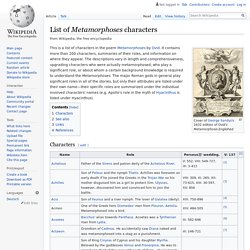
Vulcan. From Wikipedia, the free encyclopedia Jump to navigationJump to search Vulcan may refer to:
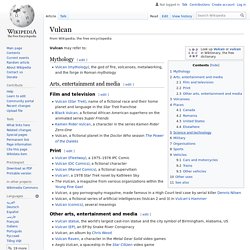
Hephaestus. Achilles. In Greek mythology, Achilles (/əˈkɪliːz/; Ancient Greek: Ἀχιλλεύς, Akhilleus, pronounced [akʰillěws]) was a Greek hero of the Trojan War and the central character and greatest warrior of Homer's Iliad.
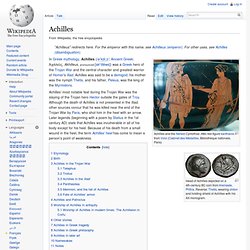
Achilles was said to be a demigod; his mother was the nymph Thetis, and his father, Peleus, was the king of the Myrmidons. Etymology[edit] Venus. Second planet from the Sun in the Solar System Venus is a terrestrial planet and is sometimes called Earth's "sister planet" because of their similar size, mass, proximity to the Sun, and bulk composition. It is radically different from Earth in other respects. Juno. From Wikipedia, the free encyclopedia Jump to navigationJump to search Juno may refer to:

Jupiter. Fifth planet from the Sun in the Solar System Formation and migration Astronomers have discovered nearly 500 planetary systems with multiple planets.
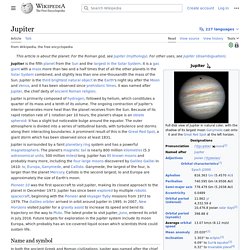
Regularly these systems include a few planets with masses several times greater than Earth's (super-Earths), orbiting closer to their star than Mercury is to the Sun, and sometimes also Jupiter-mass gas giants close to their star. Earth and its neighbor planets may have formed from fragments of planets after collisions with Jupiter destroyed those super-Earths near the Sun. As Jupiter came toward the inner Solar System, in what theorists call the grand tack hypothesis, gravitational tugs and pulls occurred causing a series of collisions between the super-Earths as their orbits began to overlap.[24] Researchers from Lund University found that Jupiter's migration went on for around 700,000 years, in a period approximately 2–3 million years after the celestial body started its life as an ice asteroid far from the sun. Physical characteristics. Hippolytus. Hippolytus. Vesta. From Wikipedia, the free encyclopedia Jump to navigationJump to search Vesta may refer to:
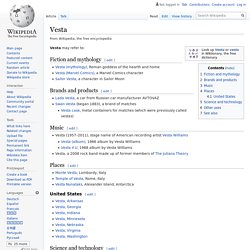
Hestia. Greek goddess Etymology[edit] Hestia's name means "hearth, fireplace, altar",[2] This stems from the PIE root *wes, "burn" (ult. from *h₂wes- "dwell, pass the night, stay").[3][4][5] It thus refers to the oikos, the domestic, home, household, house, or family.
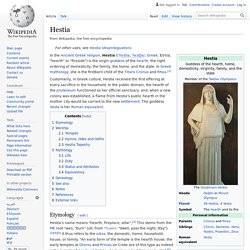
"An early form of the temple is the hearth house; the early temples at Dreros and Prinias on Crete are of this type as indeed is the temple of Apollo at Delphi which always had its inner hestia".[6] The Mycenaean great hall (megaron), like Homer's hall of Odysseus at Ithaca, had a central hearth. Vertumnus. We ask you, humbly, to help.
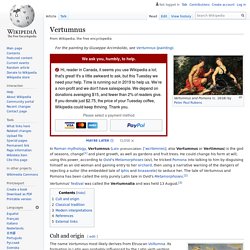
Hi, reader in Canada, it seems you use Wikipedia a lot; that's great! It's a little awkward to ask, but this Tuesday we need your help. Time is running out in 2019 to help us. We’re a non-profit and we don't have salespeople. We depend on donations averaging $15, and fewer than 2% of readers give. Thank you! Vertumnus' festival was called the Vertumnalia and was held 13 August.[3] Pomona. Venus. Aphrodite. Ancient Greek goddess of love Etymology Hesiod derives Aphrodite from aphrós (ἀφρός) "sea-foam", interpreting the name as "risen from the foam",[5] but most modern scholars regard this as a spurious folk etymology.
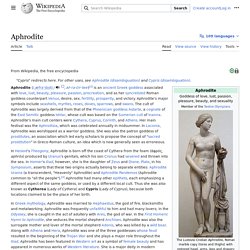
Early modern scholars of classical mythology attempted to argue that Aphrodite's name was of Greek or Indo-European origin, but these efforts have now been mostly abandoned. Aphrodite's name is generally accepted to be of non-Greek, probably Semitic, origin, but its exact derivation cannot be determined. A number of improbable non-Greek etymologies have also been suggested. Origins Near Eastern love goddess. Ithaca. Regional unit in Ionian Islands, Greece Ithaca, Ithaki or Ithaka (; Greek: Ιθάκη, Ithaki [iˈθaci]; Ancient Greek: Ἰθάκη, Ithakē [i.tʰá.kɛː]) is a Greek island located in the Ionian Sea, off the northeast coast of Kefalonia and to the west of continental Greece.
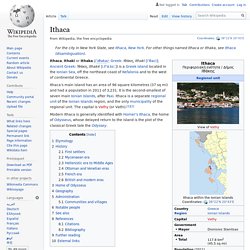
Modern Ithaca is generally identified with Homer's Ithaca, the home of Odysseus, whose delayed return to the island is the plot of the classical Greek tale the Odyssey. Etymology[edit] Although the name Ithaca has remained unchanged since ancient times, written documents of different periods also refer to the island by other names, such as: Val di Compare (Valley of the Bestman), Piccola (Small) Cephallonia, Anticephallonia (Middle Ages until the beginning of the Venetian period)Ithaki nisos (Greek for island), Thrakoniso, Thakou, Thiakou (Byzantine period)Thiaki (Byzantine and before the Venetian period)Teaki (Venetian period)Fiaki (Ottoman period) Triton. Triton commonly refers to: Triton may also refer to: Places[edit]
Neptune. Eighth and farthest planet from the Sun in the Solar System Like Jupiter and Saturn, Neptune's atmosphere is composed primarily of hydrogen and helium, along with traces of hydrocarbons and possibly nitrogen, though it contains a higher proportion of "ices" such as water, ammonia and methane.
However, similar to Uranus, its interior is primarily composed of ices and rock;[15] Uranus and Neptune are normally considered "ice giants" to emphasise this distinction.[16] Traces of methane in the outermost regions in part account for the planet's blue appearance.[17] In contrast to the hazy, relatively featureless atmosphere of Uranus, Neptune's atmosphere has active and visible weather patterns. For example, at the time of the Voyager 2 flyby in 1989, the planet's southern hemisphere had a Great Dark Spot comparable to the Great Red Spot on Jupiter. History Discovery Naming. Tisiphone. Tisiphone (Ancient Greek: Τισιφόνη), or Tilphousia, was one of the three Erinyes or Furies. Her sisters were Alecto and Megaera.[1] She was the one who punished crimes of murder: parricide, fratricide and homicide.
In literature[edit] In Book VI of Virgil's Aeneid, she is described as the guardian of the gates of Tartarus, 'clothed in a blood-wet dress'.[2] In Book X of Virgil's Aeneid, she is described as 'pale' and raging 'among the warring thousands' during the battle between Mezentius and Aeneas's men.[3] According to one myth, she fell in love with a mortal, Cithaeron, but was spurned; in her anger she formed a poisonous snake from her hair, which bit and killed him.[6] In Book I of Chaucer's "Troilus and Criseyde", the narrator calls upon her to help him to write the tragedy properly.[7] Ships[edit] Between 1779 and 1816 there was a British navy fireship (later converted to a sloop) named after the goddess.[8][better source needed]
Erinyes. Female chthonic deities of vengeance. Tiresias. Tiresias strikes two snakes with a stick, and is transformed into a woman by Hera. Engraving by Johann Ulrich Kraus c. 1690. Taken from Die Verwandlungen des Ovidii (The Metamorphoses of Ovid). Thebes. Pyramus and Thisbe. Thetis.
Achilles. Nereus. Theseus. Legendary king of Athens Theseus (, ; Greek: Θησεύς [tʰɛːsěu̯s]) was the mythical king and founder-hero of Athens. Pittheus. Aegeus. Theseus Recognized by his Father by Hippolyte Flandrin (1832) Aethra. Themis. Ancient Greek Titaness. Pythia. Apollo. Gaia. Uranus. Tereus. Philomela. Thrace. Procne. Mars. Telamon.
Ajax the Great. Phocus. Peleus. Syrinx. Phragmites. Pan. Arcadia. Sibyl. Cumae. Semele. Dionysus. Cadmus. Scylla. Strait of Messina. Circe.